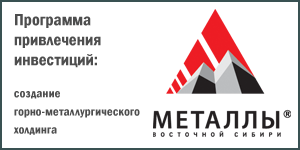Halia Pavliva
Russian equities traded in New York tumbled to a
three-month low on concern shrinking manufacturing in China and
Europe will curb demand for metals and oil.
The Bloomberg Russia-US Equity Index (RUS14BN)
of the most-traded Russian companies in the U.S. dropped 1.9
percent to 101.81 in New York, the lowest level since Jan. 24, led
by hydropower company OAO RusHydro and OAO GMK Norilsk Nickel, the
world’s biggest producer of the metal. Moscow’s Micex Index
(INDEXCF) slipped 2.6 percent to close at 1,466.34, after the
evening session of trading was halted for about four hours for
technical reasons.
All but three of the 14 stocks in the Russia-US
gauge dropped yesterday as a preliminary purchasing managers’ index
signaled Chinese manufacturing may contract for a sixth month in
April. Crude, Russia’s biggest export earner, slid the most in two
weeks and copper, nickel and aluminum prices sank. In the euro
zone, an index based on a survey of purchasing managers in services
and manufacturing fell to a five-month low.
“Russia, being a high beta market, gets
negatively impacted when there is evidence of global slowdown,”
Arjun Jayaraman, who manages $400 million in emerging-market
equities at Causeway Capital Management LLC in Los Angeles, said by
e- mail yesterday. “The PMI numbers coming out of China, as well as
Europe, indicate contraction. Oil prices are also being negatively
impacted by this.”
Futures expiring in June on Russia’s
dollar-denominated RTS Index, which weren’t affected by the
Micex-RTS trading disruption, added 0.8 percent to 153,475.
RusHydro Slump
RusHydro’s American depositary receipts fell 4.1
percent in New York, the most since March 6, to $3.50. The ADRs
traded at a 0.8 percent discount to the company’s Moscow-listed
shares, data compiled by Bloomberg show. The Moscow-based company
was the biggest decliner on the Bloomberg Russia-US Equity index
today.
In Moscow, RusHydro dropped 3.8 percent to
1.0425 rubles, or 4 U.S. cents. One U.S.-traded ADR in the company
is equal to 100 ordinary shares in Moscow.
Norilsk fell 3.8 percent in New York to $17.34,
the most since March 20, to trade at a 0.5 percent discount to the
company’s Moscow-listed shares. Ten U.S.-listed ADRs are equal to
one ordinary share of Norilsk. The stock fell 3.4 percent to 5,147
rubles, or $174.23, in Moscow yesterday.
The Market Vectors Russia ETF (RSX), a
U.S.-traded fund that holds Russian shares, declined 2.3 percent,
the most since April 10, to $29.63 yesterday. The RTS Volatility
Index, which measures expected swings in the index futures, dropped
0.9 percent to 32.97 points in U.S. trading.
‘Spread Too Thin’
VimpelCom Ltd. (VIP), the world’s sixth-largest
wireless operator by subscribers, said in a statement yesterday
that it sold its entire 49 percent stake in its GTEL subsidiary in
Vietnam for $45 million in cash. VimpelCom slipped 3.6 percent to
$9.82 in New York, the lowest since Jan. 4.
“VimpelCom selling its Vietnam
operations fits in with what I have been saying about them being
spread too thin to manage so many markets,” Hawk Sunshine, who
manages $300 million in assets at brokerage IFC Metropol in Moscow,
said by e-mail.
Russia’s Micex-RTS Exchange resumed trading on
its indexes at 9:50 p.m. yesterday in Moscow, according to a
statement on the bourse’s website. Trading data from 5:41 p.m. on
will be restored, the statement said.
It was the second trading halt since the Micex
and RTS exchanges merged in December and the third in the past 12
months, Nikita Bekasov, spokesman for the exchange, said yesterday
by phone. False data was reflected in the trading system for an
unknown reason and the Micex-RTS is undertaking an investigation,
he said.
Micex-RTS ‘Emergency’
“We hope there will be no loss to anyone,”
Bekasov said, adding that equities and bonds trading on the Micex’s
main market were affected. “We treated the situation as an
emergency, making sure no one left work here at the Micex before
the system was restored.”
Brazil’s Bovespa Index has delayed the start of
trading three times over the past 12 months in Sao Paulo. The last
time the exchange used a circuit breaker to halt trading was in
October 2008.
“Clients seem frustrated,” Luis Saenz, chief
executive officer of the U.S. unit of Moscow brokerage Otkritie
Financial Corp., said in a phone interview yesterday. “I hope that
it doesn’t resemble how they deal with the future reforms coming
up.”
Russia’s Micex-RTS Exchange plans to debut a
central securities depositary in July and move away from immediate
settlement of transactions, changes that bring the market into line
with developed market bourses and will allow conservative investors
such as pension funds to buy Russian equities, Micex- RTS President
Ruben Aganbegyan said in an interview at Bloomberg’s headquarters
in New York on April 16.
Crude Slides
Crude oil for June delivery dropped 0.7 percent
to $103.11 a barrel on the New York Mercantile Exchange yesterday.
Futures have declined 8.2 percent in the past year.
Brent oil for June settlement was little changed
at $118.71 a barrel on the London-based ICE exchange. Urals crude,
Russia’s main export blend, was little changed at $115.75.
The Standard & Poor’s GSCI Index of 24
commodities declined 0.3 percent yesterday.
http://www.bloomberg.com/news/2012-04-23/stocks-drop-to-3-month-low-on-shrinking-output-russia-overnight.html







